McDuff, The Talking Dog was a Saturday morning live action television program that aired on NBC in 1976. The show centered on the ghost of a 100-year-old sheepdog who used to live in the home now owned by a veterinarian, Dr. Calvin Campbell. McDuff could talk not only to the other animals, but also to Dr. Campbell. However, Dr. Campbell was the only person who could hear or see McDuff, which often led to wacky situations.

Britannia of Billingsgate is a 1933 British musical comedy film directed by Sinclair Hill and starring Violet Loraine, Gordon Harker, Kay Hammond and John Mills. A family who work in the fish trade at Billingsgate Market encounter a film crew who are shooting there. It was based on the play Britannia of Billingsgate by Christine Jope-Slade and Sewell Stokes.

George Willison (1741–1797) was a Scottish portrait-painter. He is best known for his works done in India.
Road House is a 1934 British comedy crime film directed by Maurice Elvey and starring Violet Loraine, Gordon Harker and Aileen Marson.

Blue Skies is a 1929 American drama film directed by Alfred L. Werker and starring Carmencita Johnson, Freddie Burke Frederick, and Ethel Wales. The film is based on a short story called The Matron's Report by Frederick Hazlitt Brennan. The short story also formed the basis for 1936's Little Miss Nobody.
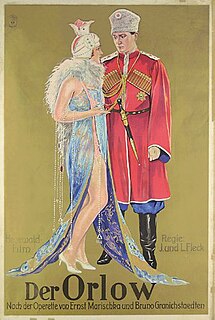
The Orlov is a 1927 German silent film directed by Jacob Fleck and Luise Fleck and starring Vivian Gibson, Hans Junkermann and Georg Alexander.

Time to Remember is a 1962 British crime film directed by Charles Jarrott and starring Yvonne Monlaur, Harry H. Corbett and Robert Rietty.

Tunes of Glory is a 1956 novel by the British writer James Kennaway. It portrays the peacetime tensions in a Highland regiment shortly after the Second World War.
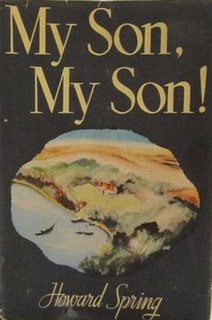
My Son, My Son is a 1938 novel by the British writer Howard Spring.

Husband and Wife is a 1916 American silent drama film directed by Barry O'Neil and starring Ethel Clayton, Holbrook Blinn and Madge Evans.

If the Gods Laugh is a 1925 romantic adventure novel by the British writer and explorer Rosita Forbes. It is set against the backdrop of the Italian colonization of Libya.

King's Mate is a 1928 romantic adventure novel by the British writer and explorer Rosita Forbes. While staying in Morocco a young Englishwoman becomes lost in the desert and is rescued by a mysterious figure known as the White Sheik, who proves to be an Englishman.
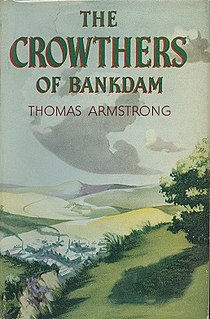
The Crowthers of Bankdam is a 1940 historical novel by the British writer Thomas Armstrong. His debut novel, it is a family saga following the fortunes of the Crowther family of Yorkshire mill owners across several generations from 1854. A popular success, it was followed by three sequels collectively known as the Crowther Chronicles
The Woman in the Hall is a 1939 novel by the British writer Gladys Bronwyn Stern. The lifestyle of a confidence trickster mother has a psychologically disturbing effect on her daughter who she uses as an essential part in her various swindles.
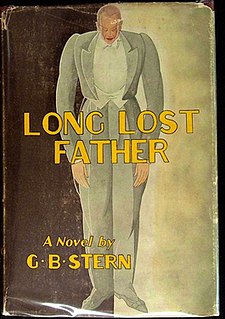
Long Lost Father is a 1933 novel by the British writer Gladys Bronwyn Stern. A woman's long-lost wastrel father comes back into her life after many years absence.

Turn the Key Softly is a 1951 novel by the British writer John Brophy. It follows the lives of three women in the first dozen hours after they are released from prison.

Gentleman of Stratford is a 1939 historical novel by the British writer John Brophy. It is a fictional account of the life of William Shakespeare. Brophy carefully researched the novel to use existing documentary evidence about the playwright. The novel was published in the United States by Harper. It helped launch Brophy's career as a novelist. Author Hugh Walpole described it as "the best biographical novel yet written about Shakespeare".
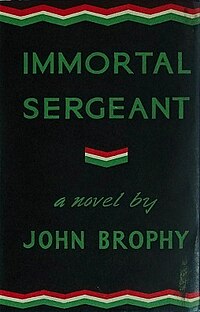
Immortal Sergeant is a 1942 war novel by the British writer John Brophy. The novel is set during the North African campaign of the Second World War and seen through the eyes of a British corporal fighting across the Libyan desert whose comrade, a sergeant, is killed.
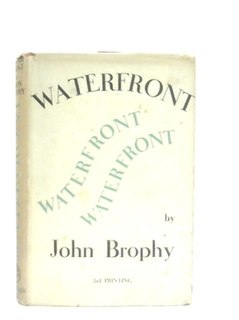
Waterfront is a 1934 crime drama novel by the British writer John Brophy. It is set in his native Liverpool amongst the world of dockworkers.

Target Island is a 1944 war novel by the British writer John Brophy. It was published by Collins in London and Harper in New York. It takes place during the Axis Siege of Malta during the Second World War. While popular, it did not repeat the great success of Brophy's previous novel Immortal Sergeant set during the North African Campaign. John Hampson writing in The Spectator gave it a fairly negative review alongside Vicki Baum's Berlin Hotel and noted "here again are major and minor figures, love-affairs, raids, and alarms, amid the panoply of modern war. And yet nothing has been added to the epic of Malta that we didn't already know. However, its film possibilities will be obvious to the cinema fan". In the event the novel was not adapted for the screen unlike several others of Brophy's work, although much of its settings and themes featured in the 1953 film Malta Story.

















